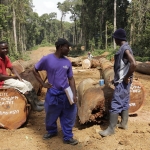First Hand Experience
 "I have seen people at work who do speak up and defend themselves, and they're the first ones fired. Or when the new season comes, they don't get hired. People can't speak up because if they do, they're quickly let go." --- Esperanza, a strawberry worker in Watsonville, California
"I have seen people at work who do speak up and defend themselves, and they're the first ones fired. Or when the new season comes, they don't get hired. People can't speak up because if they do, they're quickly let go." --- Esperanza, a strawberry worker in Watsonville, California
[Photo: David Bacon]
 The United Farm Workers' Strawberry Workers Campaign aims to unionize 20,000 strawberry workers in the Watsonville/Salinas area. With a union contract, farmworkers will have the job security they need to speak out against dangerous pesticides, like methyl bromide. Here, a UFW Organizer talks with strawberry workers on their lunch break.
The United Farm Workers' Strawberry Workers Campaign aims to unionize 20,000 strawberry workers in the Watsonville/Salinas area. With a union contract, farmworkers will have the job security they need to speak out against dangerous pesticides, like methyl bromide. Here, a UFW Organizer talks with strawberry workers on their lunch break.
[Photo: David Bacon]
 When fields are treated with methyl bromide, a tractor injects the chemical into the ground, then lays plastic tarps over the treated areas. A farm worker is ususally hired to shovel dirt over the edges of these tarps immediately after the tractor lays them down. One man who held that job for several weeks says he had to stop due to severe and recurring vision problems. "If you're not fast enough, you get hit in the face with little blasts of poison."
When fields are treated with methyl bromide, a tractor injects the chemical into the ground, then lays plastic tarps over the treated areas. A farm worker is ususally hired to shovel dirt over the edges of these tarps immediately after the tractor lays them down. One man who held that job for several weeks says he had to stop due to severe and recurring vision problems. "If you're not fast enough, you get hit in the face with little blasts of poison."
[Photo: Farm without Harm]
 Due to heavy lobbying by the agriculture industry, methyl bromide only requires notification under California's Proposition 65 when it is used as a structural fumigant. "The state knows methyl bromide causes birth defects. If my neighbor uses it on her house, I get a written warning, but if they use thousands of pounds in my backyard I get no warning at all." --- Karen Light, a co-founder of Farm without Harm, whose backyard borders a strawberry field in Castroville, California. Many playgrounds like this one also border fields and are considered "buffer" zones.
Due to heavy lobbying by the agriculture industry, methyl bromide only requires notification under California's Proposition 65 when it is used as a structural fumigant. "The state knows methyl bromide causes birth defects. If my neighbor uses it on her house, I get a written warning, but if they use thousands of pounds in my backyard I get no warning at all." --- Karen Light, a co-founder of Farm without Harm, whose backyard borders a strawberry field in Castroville, California. Many playgrounds like this one also border fields and are considered "buffer" zones.
[Photo: Farm without Harm]
- 181 Food and Agriculture



